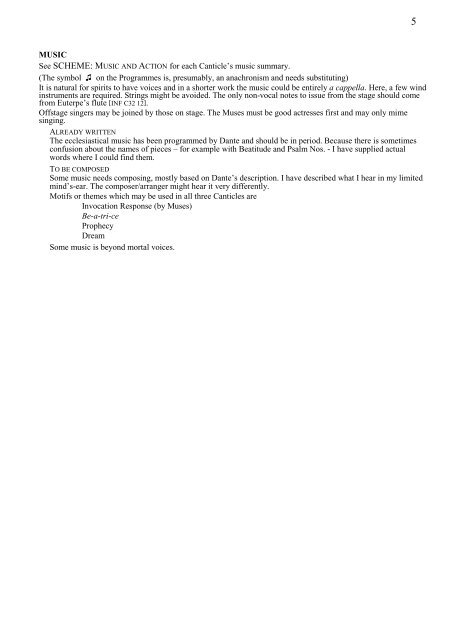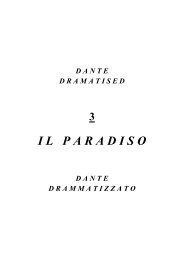- Page 1 and 2: D A N T E D R A M A T I S E D 1 L
- Page 3 and 4: 2. TITLE PAGE DANTE DRAMATISED DANT
- Page 5: 10. PRESENT & PAST (occasional): A
- Page 9 and 10: PHLEGYAS FILIPPO ARGENTI ---- ? PLU
- Page 11 and 12: V - voice only no voice NAME SEEN F
- Page 13 and 14: MUSIC & ACTION MALE: *CHARACTER voi
- Page 15 and 16: CITY OF DIS: FALLEN ANGELS MUSES AL
- Page 17 and 18: BUOSO DE DUERA / POLYHYMNIA C32 19-
- Page 19 and 20: PLACE CHARACTERS V - voice only no
- Page 21 and 22: PLACE CHARACTERS V - voice only no
- Page 23 and 24: PLACE CHARACTERS VENETO V - voice o
- Page 25 and 26: PLACE CHARACTERS GREECE V - voice o
- Page 27 and 28: PLACE CHARACTERS SPAIN CARTAGENA /
- Page 29 and 30: ? ? ? Maria corse con fretta a la m
- Page 31 and 32: DANTE: INF C1 1-3 / DANTE INF C1 1-
- Page 33 and 34: INF C1 25-27 / DANTE così l'animo
- Page 35 and 36: VIRGIL POINTS IN TWO DIRECTIONS. VI
- Page 37 and 38: DANTE: INF C1 130-132 / DANTE INF C
- Page 39 and 40: INF C2 25-27 / DANTE Per quest' and
- Page 41 and 42: e par che sia una cosa venuta she s
- Page 43 and 44: BEATRICE: INF C2 109-111 / DANTE IN
- Page 45 and 46: THE GATE OF HELL ♫INFERNAL: SOFT,
- Page 47 and 48: VIRGIL (VOICE): INF C3 34-36 / DANT
- Page 49 and 50: CHARON & SOULS DANTE AND VIRGIL EME
- Page 51 and 52: DANTE: INF C3 100-102 / DANTE INF C
- Page 53 and 54: VIRGIL POINTS DOWN. VIRGIL: INF C4
- Page 55 and 56: VIRGIL (VOICE): INF C4 61-63 / DANT
- Page 57 and 58:
THE POETS EMBRACE VIRGIL. DANTE WRI
- Page 59 and 60:
DIDO (UNSEEN) HEARS THE NAME AENEAS
- Page 61 and 62:
DANTE: & VIRGIL: INF C4 139-141 / D
- Page 63 and 64:
THE LUSTFUL ♫WIND / PERSONS HOWLI
- Page 65 and 66:
(ALTERNATIVELY, DIDO SPEAKS IN VIRG
- Page 67 and 68:
FRANCESCA: INF C5 97-99 / DANTE INF
- Page 69 and 70:
NOW THEY SPEAK ALTERNATELY. PAOLO:
- Page 71 and 72:
VIRGIL: INF C6 13-15 / DANTE INF C6
- Page 73 and 74:
CIACCO: INF C6 64-66 / DANTE INF C6
- Page 75 and 76:
PLUTO / PLUTUS *MYTHICAL AGE : *? P
- Page 77 and 78:
CHURCHMEN & FORTUNE ♫INFERNAL: FA
- Page 79 and 80:
INF C7 88-90 / DANTE Le sue permuta
- Page 81 and 82:
THE FERRY: PHLEGYAS DANTE POINTS TO
- Page 83 and 84:
FILIPPO ARGENTI *---- ? - *---- ? A
- Page 85 and 86:
CITY OF DIS: FALLEN ANGELS VIRGIL:
- Page 87 and 88:
VIRGIL APPROACHES THE DOORKEEPER. D
- Page 89 and 90:
DANTE IS AFRAID, SEEING ‘HOW HE H
- Page 91 and 92:
VIRGIL: INF C9 73-75 / DANTE INF C9
- Page 93 and 94:
DANTE (VOICE): INF C9 106-108 / DAN
- Page 95 and 96:
FARINATA DEGLI UBERTI: INF C10 25-2
- Page 97 and 98:
♫PROPHECY MOTIF * * * * * * * * *
- Page 99 and 100:
CANTO 11 VIOLENCE ETC INF C11 1-9 /
- Page 101 and 102:
INF C11 52-54 / DANTE La frode, ond
- Page 103 and 104:
VIRGIL: INF C11 100-102 / DANTE INF
- Page 105 and 106:
104 VIRGIL: INF C12 19-21 / DANTE I
- Page 107 and 108:
NESSUS MYTHICAL AGE : *? PLACE./.LA
- Page 109 and 110:
108 INF C12 103-105 / DANTE INF C12
- Page 111 and 112:
♫HARPIES + SOULS BOUM, BELLUM + S
- Page 113 and 114:
PIER DELLE VIGNE 1190? - 1249 AGE :
- Page 115 and 116:
114 INF C13 79-84 / KLINE The poet
- Page 117 and 118:
THE CHASE MUSIC CEASES. DANTE LOOKS
- Page 119 and 120:
INF C14 46-48 / DANTE chi è quel g
- Page 121 and 122:
DANTE versifies: INF C14 94-96 / DA
- Page 123 and 124:
THE REAR CURTAIN IS UP. VIRGIL AND
- Page 125 and 126:
INF C15 52-54 / DANTE Pur ier matti
- Page 127 and 128:
DANTE: INF C15 88-90 / DANTE INF C1
- Page 129 and 130:
128 GUIDO GUERRA *---- ? - 1272 AGE
- Page 131 and 132:
INF C16 61-63 / DANTE Lascio lo fel
- Page 133 and 134:
132 DANTE: INF C16 124-126 / DANTE
- Page 135 and 136:
INF C17 82-84 / DANTE Omai si scend
- Page 137 and 138:
DANTE: INF C17 133-135 / DANTE INF
- Page 139 and 140:
INF C18 37-39 / DANTE Ahi come face
- Page 141 and 142:
140 INF C18 100-118 / KLINE We had
- Page 143 and 144:
INF C19 28-45 / DANTE As the flame
- Page 145 and 146:
144 INF C19 94-96 / DANTE Né Pier
- Page 147 and 148:
SEERS & SORCERERS: TEARS DANTE SPEA
- Page 149 and 150:
MANTUA & MANTO DANTE’S EYES ARE S
- Page 151 and 152:
DANTE: INF C20 100-102 / DANTE INF
- Page 153 and 154:
DEMONS DANTE COMES BACK UP THE →
- Page 155 and 156:
SCARMIGLIONE (VOICE): INF C21 49 /
- Page 157 and 158:
INF C21 97-99 / KLINE I pressed my
- Page 159 and 160:
DANTE SPEAKS WITH ANGER AND DISGUST
- Page 161 and 162:
CANTO 23 160 INF C23 1-18 / KLINE S
- Page 163 and 164:
INF C23 82-87 / KLINE I stood still
- Page 165 and 166:
VIRGIL STRIDES DOWN THE → R → ,
- Page 167 and 168:
DANTE ATTEMPTS TO CLIMB THE WALL BU
- Page 169 and 170:
INF C24 85-87 / DANTE Più non si v
- Page 171 and 172:
VANNI FUCCI (VOICE): INF C24 124-12
- Page 173 and 174:
VANNI FUCCI & VANNI FUCCI: INF C25
- Page 175 and 176:
PUCCIO (VOICE): INF C25 43-45 / DAN
- Page 177 and 178:
INF C25 103-105 / DANTE Insieme si
- Page 179 and 180:
DANTE (VOICE): INF C26 25-27 / DANT
- Page 181 and 182:
pious Aeneas virtuous Aeneas dutifu
- Page 183 and 184:
THE ULYSSES & .CALLIOPE SHIP MOVES
- Page 185 and 186:
DANTE’S SPEECH WAS PROBABLY PREPA
- Page 187 and 188:
INF C27 88-90 / DANTE ché ciascun
- Page 189 and 190:
THE SOWERS OF DISCORD DANTE AND VIR
- Page 191 and 192:
INF C28 124-126 / DANTE Di sé face
- Page 193 and 194:
192 VIRGIL TURNS AT HIS WORDS AND D
- Page 195 and 196:
CAPOCCHIO *---- ? - 1293 PLACE./.LA
- Page 197 and 198:
196 WE DON’T KNOW WHAT DANTE SAW
- Page 199 and 200:
198 HE HITS ADAMO IN THE STOMACH AG
- Page 201 and 202:
NIMROD DANTE SUDDENLY LOOKS INTO TH
- Page 203 and 204:
INF C31 58-60 / DANTE La faccia sua
- Page 205 and 206:
INF C32 4-6 / DANTE io premerei di
- Page 207 and 208:
206 INF C32 25-30 / DANTE The Danub
- Page 209 and 210:
DANTE SPEAKS TO BOCCA./.URANIA. DAN
- Page 211 and 212:
210 DANTE: INF C33 1-3 / DANTE INF
- Page 213 and 214:
♫INFERNAL: COLD: BLANK DAY * * *
- Page 215 and 216:
INF C33 97-99 / DANTE ché le lagri
- Page 217 and 218:
VEXILLA REGIS: ASCENT & DAMN! 216 V
- Page 219 and 220:
THE DARK BECOMES DIMNESS. WE SEE DA
- Page 221 and 222:
INF C34 136-138 / DANTE salimmo sù
- Page 223 and 224:
222
- Page 225:
232 L’ I N F E R N O DARK WOOD &



